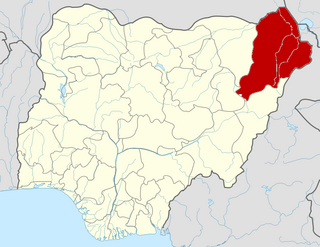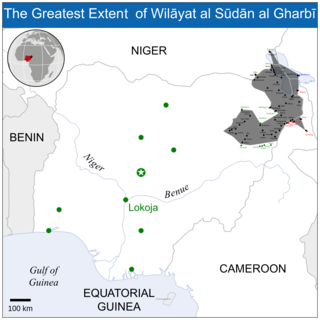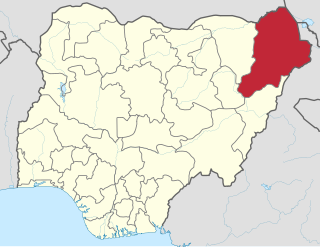Related Research Articles

Boko Haram, officially known as Jamā'at Ahl as-Sunnah lid-Da'wah wa'l-Jihād, is an Islamist militant organization based in northeastern Nigeria, which is also active in Chad, Niger, northern Cameroon, and Mali. Boko Haram was the world's deadliest terror group during part of the mid-2010s according to the Global Terrorism Index. In 2016, the group split, resulting in the emergence of a hostile faction known as the Islamic State's West Africa Province.
Abadam is a remote Local Government Area of Borno State, Nigeria, on the western coast of Lake Chad. It borders Chad and Niger, and it's very close to Cameroon, in 2016 its population is projected to be 140,000 inhabitants, It has its headquarters in the town of Malumfatori. Security, Healthcare, infrastructure, and climate change are some of the major challenges in Abadam Local government.
Chibok is a Local Government Area of Borno State, Nigeria, located in the southern part of the state. It has its headquarters in the town of Chibok.

Gwoza is a local government area of Borno State, Nigeria. Its headquarters are in the town of Gwoza, a border town "about 135 kilometres South-East of Maiduguri." The postal code of the area is 610.
Fotokol is a town and commune in Logone-et-Chari Department, Far North Region, Cameroon. It is home to Fotokol High School.

The A3 highway is a major arterial road in Nigeria, connecting the city of Port Harcourt in the south to the Cameroon border at Gamboru in the northeast. It is a transportation route, serving several cities and regions in Nigeria.

The Boko Haram insurgency began in July 2009, when the militant Islamist and jihadist rebel group Boko Haram started an armed rebellion against the government of Nigeria. The conflict is taking place within the context of long-standing issues of religious violence between Nigeria's Muslim and Christian communities, and the insurgents' ultimate aim is to establish an Islamic state in the region.
Timeline of the Boko Haram insurgency is the chronology of the Boko Haram insurgency, an ongoing armed conflict between Nigerian Islamist group Boko Haram and the Nigerian government. Boko Haram have carried out many attacks against the military, police and civilians since 2009, mostly in Nigeria. The low-intensity conflict is centred on Borno State. It peaked in the mid 2010s, when Boko Haram extended their insurgency into Cameroon, Chad and Niger.
The Konduga massacre took place in Konduga, Borno State, Nigeria on 11 February 2014. The massacre was conducted by Boko Haram Islamists against Christian villagers. At least 62 people were killed.

On the night of 14–15 April 2014, 276 mostly Christian female students aged from 16 to 18 were kidnapped by the Islamic terrorist group Boko Haram from the Government Girls Secondary School at the town of Chibok in Borno State, Nigeria. Prior to the raid, the school had been closed for four weeks due to deteriorating security conditions, but the girls were in attendance in order to take final exams in physics.
Gamboru is a market town in Borno State, northeast Nigeria, near the Cameroon border. It is the administrative centre of Ngala local government area.

The Gwoza massacre was a terrorist event that occurred on 2 June, 2014 in the Gwoza local government district, Borno State near the Nigerian-Camerounian border.
From 20 to 23 June 2014, a series of attacks occurred in Borno State, Nigeria. 91 women and children were kidnapped in the attacks and more than 70 people were killed.
The following lists events from 2014 in Nigeria.
The following lists events that happened during 2015 in Nigeria.
The 2015 Baga massacre was a series of mass killings carried out by the Boko Haram terrorist group in the north-eastern Nigerian town of Baga and its environs, in the state of Borno, between 3 January and 7 January 2015.

Starting in late January 2015, a coalition of West African troops launched an offensive against the Boko Haram insurgents in Nigeria.

The Chad Basin campaign of 2018–2020 was a series of battles and offensives in the southern Chad Basin, particularly northeastern Nigeria, which took place amid the ongoing Boko Haram insurgency. The Chad Basin witnessed an upsurge of insurgent activity from early November 2018, as rebels belonging to the Islamic State's West Africa Province (ISWAP) and Boko Haram launched offensives and several raids to regain military strength and seize territory in a renewed attempt to establish an Islamic state in the region. These attacks, especially those by ISWAP, met with considerable success and resulted in the displacement of hundreds of thousands of civilians. The member states of the Multinational Joint Task Force (MJTF), namely Nigeria, Niger, Chad, and Cameroon responded to the increased insurgent activity with counter-offensives. These operations repulsed the rebels in many areas, but failed to fully contain the insurgency.

At about 5pm on 6 January 2020, a bomb exploded at a market in Gamboru, Borno State, northeastern Nigeria. The market is located on a bridge which connects Gamboru to Fotokol, Logone-et-Chari, Far North Region, Cameroon. The bombing killed 38 people and injured over 35 others. No group claimed responsibility. Boko Haram often carry out attacks in the region, their insurgency having caused over 35,000 deaths since it began in 2009.

The Koshebe massacre took place on 28 November 2020 in the village of Koshebe, Nigeria, in Borno State, when as many as 110 civilians and peasant farmers were killed and six were wounded as they worked in rice fields in Koshebe village, near the northeast Nigerian city of Maiduguri. The attack was thought to be carried out by the Boko Haram insurgency. About 15 women were also kidnapped.
References
- 1 2 3 "Boko Haram Attack Kills Hundreds In Border Town". The Huffington Post . Retrieved 7 May 2014.
- 1 2 de Montclos, Marc-Antoine Pérouse (2017-05-08), "Boko Haram", Understanding Boko Haram, Routledge, pp. 19–40, doi:10.4324/9781315525051-2, ISBN 978-1-315-52505-1 , retrieved 2020-05-16
- ↑ "Terrorism survivor in Cameroon takes road to recovery: UN News special report". UN News. 2019-08-19. Retrieved 2020-02-05.
- ↑ "Boko Haram kidnaps more girls in Nigeria", ABC, AU, 6 May 2014
- ↑ Suspected Boko Haram gunmen kidnap eight girls from village in Nigeria. Monica Mark, The Guardian website; Tuesday 6 May 2014 19.21 BST.
- ↑ Boko Haram kidnaps more children, kills villagers in Nigeria. Sabrina Ford, Laura Italiano and Post Wires; New York Post, May 11, 2014 | 1:35am.
- 1 2 Жертвами нападения "Боко Харам" на город в Нигерии стали 300 человек (in Russian). RIA Novosti. 7 May 2014. Retrieved 7 May 2014.
- ↑ "Nigeria confirms market massacre blamed on Boko Haram". BBC News. 8 May 2014. Retrieved 10 May 2014.
- 1 2 Adam Nossiter (7 May 2014). "Islamist Militants Kill Hundreds of Civilians in Northeastern Nigeria". The New York Times . Retrieved 10 May 2014.
- ↑ "Nigerian official: Hundreds killed in attack". The Washington Post . Archived from the original on 8 May 2014. Retrieved 7 May 2014.